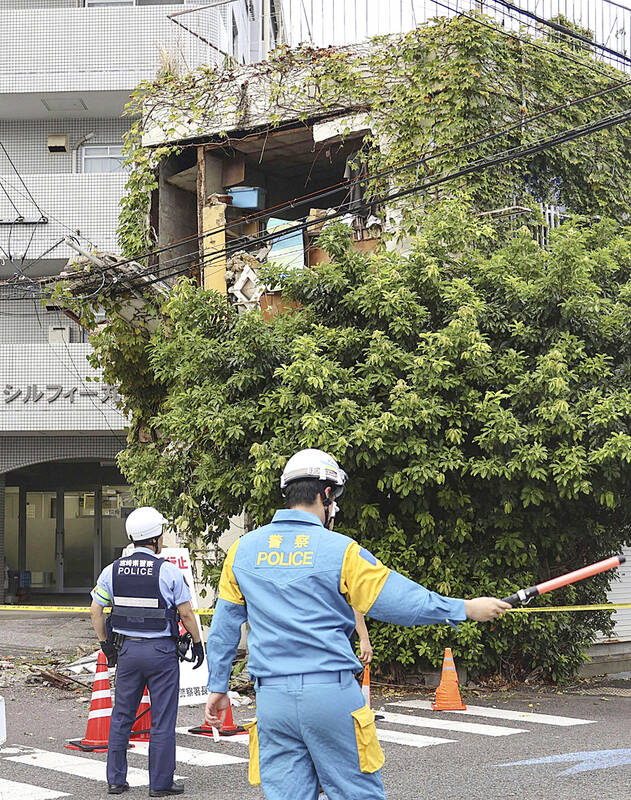A powerful earthquake with a magnitude of 7.1 shook southern Japan yesterday, but no major damage was reported and only relatively minor tsunami arrived at the coast.
The quake hit at 4:42pm off Kyushu at a depth of 25km, the US Geological Survey said.
Broadcaster NHK showed footage of traffic lights shaking violently in Miyazaki on Kyushu.

Photo: AP
“The surface of the sea is wavering. I felt an intense jolt when the quake happened which lasted for between 30 seconds and a minute,” a local official told NHK.
The broadcaster also reported that three people were hurt in Miyazaki, but gave no indication of the extent of their injuries.
Tsunamis of up to 1m were initially expected to arrive or had arrived in some coastal areas in Kyushu and Shikoku islands, the Japan Meteorological Agency said.
The agency also said a small tsunami was possible in Chiba, about 850km from the epicenter.
“Tsunamis will strike repeatedly. Please do not enter the sea or approach the coast until the warning is lifted,” the agency wrote on X.
However, tsunamis of only 50cm, 20cm and 10cm were confirmed to have hit some places, including the port of Miyazaki, more than an hour after the quake, it said.
No abnormalities were reported at atomic power plants in the area, Japan’s nuclear regulation authority said.
Japansese government spokesman Yoshimasa Hayashi said that “damage to people and property” was still being assessed.
“In view of this situation, the prime minister instructed [officials] to provide the public with timely and accurate information on tsunamis and evacuations,” Hayashi said.
Unverified footage shared on social media showed only minor damage, including a small wall that had collapsed in a car park.

The Burmese junta has said that detained former leader Aung San Suu Kyi is “in good health,” a day after her son said he has received little information about the 80-year-old’s condition and fears she could die without him knowing. In an interview in Tokyo earlier this week, Kim Aris said he had not heard from his mother in years and believes she is being held incommunicado in the capital, Naypyidaw. Aung San Suu Kyi, a Nobel Peace Prize laureate, was detained after a 2021 military coup that ousted her elected civilian government and sparked a civil war. She is serving a

REVENGE: Trump said he had the support of the Syrian government for the strikes, which took place in response to an Islamic State attack on US soldiers last week The US launched large-scale airstrikes on more than 70 targets across Syria, the Pentagon said on Friday, fulfilling US President Donald Trump’s vow to strike back after the killing of two US soldiers. “This is not the beginning of a war — it is a declaration of vengeance,” US Secretary of Defense Pete Hegseth wrote on social media. “Today, we hunted and we killed our enemies. Lots of them. And we will continue.” The US Central Command said that fighter jets, attack helicopters and artillery targeted ISIS infrastructure and weapon sites. “All terrorists who are evil enough to attack Americans are hereby warned

Seven wild Asiatic elephants were killed and a calf was injured when a high-speed passenger train collided with a herd crossing the tracks in India’s northeastern state of Assam early yesterday, local authorities said. The train driver spotted the herd of about 100 elephants and used the emergency brakes, but the train still hit some of the animals, Indian Railways spokesman Kapinjal Kishore Sharma told reporters. Five train coaches and the engine derailed following the impact, but there were no human casualties, Sharma said. Veterinarians carried out autopsies on the dead elephants, which were to be buried later in the day. The accident site

‘NO AMNESTY’: Tens of thousands of people joined the rally against a bill that would slash the former president’s prison term; President Lula has said he would veto the bill Tens of thousands of Brazilians on Sunday demonstrated against a bill that advanced in Congress this week that would reduce the time former president Jair Bolsonaro spends behind bars following his sentence of more than 27 years for attempting a coup. Protests took place in the capital, Brasilia, and in other major cities across the nation, including Sao Paulo, Florianopolis, Salvador and Recife. On Copacabana’s boardwalk in Rio de Janeiro, crowds composed of left-wing voters chanted “No amnesty” and “Out with Hugo Motta,” a reference to the speaker of the lower house, which approved the bill on Wednesday last week. It is